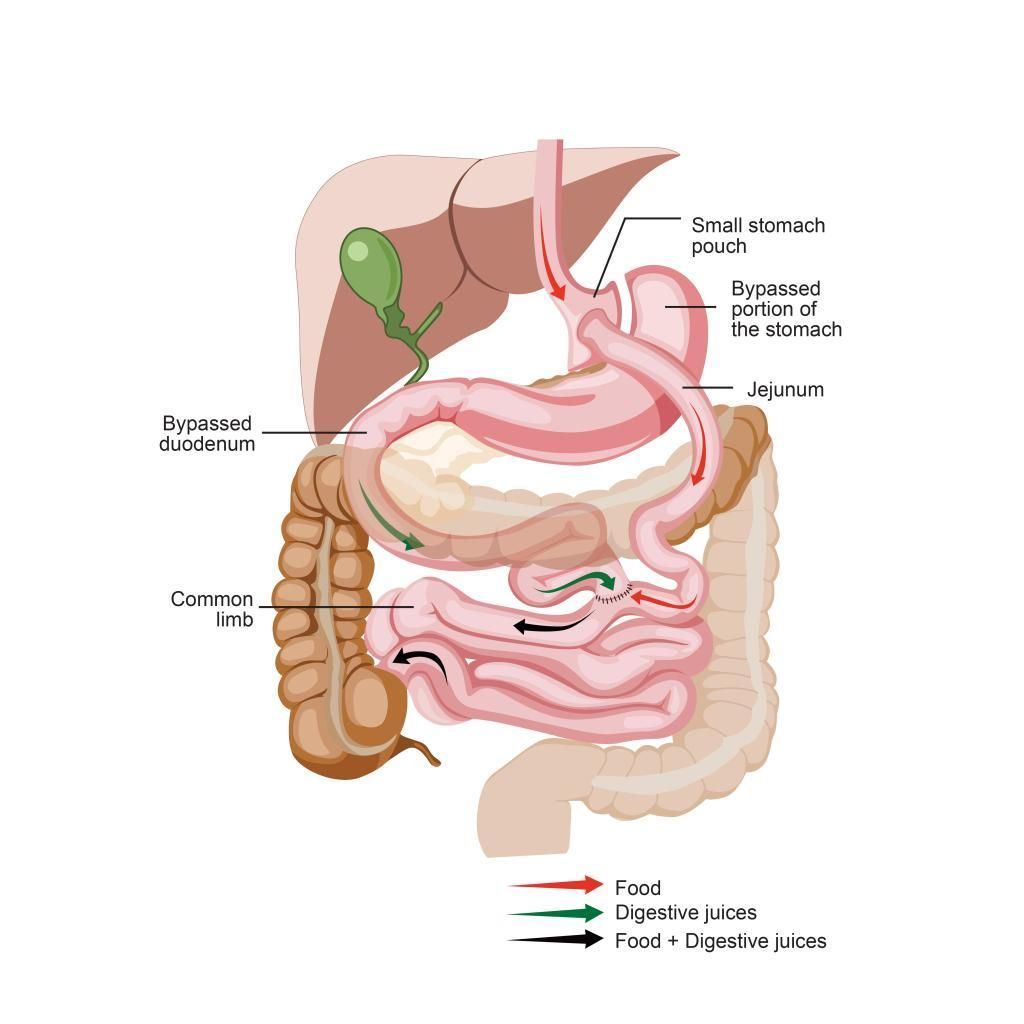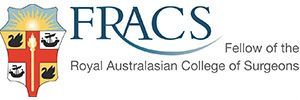Gastric Bypass: Roux en Y
What is a Gastric Bypass?
Gastric bypass surgery, or Roux-en-Y gastric bypass, is a surgical procedure for weight loss. It involves altering the digestive system to restrict food intake, reduce calorie absorption, and change the hormonal response to food and hunger. Before the gastric sleeve was invented, it was thought to be the ‘gold standard’ of weight loss surgery.
The surgical process involves creating a small stomach pouch and rerouting food directly to this pouch, bypassing most of the stomach and a segment of the small intestine. Importantly, no part of the stomach or intestines is removed, allowing for reversing the procedure if needed.

Who is a Candidate for Gastric Bypass?
Gastric bypass is typically considered for individuals with:
- Body mass index (BMI) of 35 or higher.
- BMI of 30-34.9 with obesity-related health conditions.
- Failed attempts at weight loss through diet and exercise.
- Patients with severe reflux disease, large hiatus hernias and some diabetics.
- Patient preferences
Before undergoing this type of surgery, consulting with one of the Hunter Weight Loss surgeons is crucial. They will assess your circumstances, discuss the risks and benefits, and advise if a gastric bypass is the best option.
Benefits of Gastric Bypass Surgery
Gastric Bypass surgery has several advantages. These are:
- Dramatic and sustained weight loss
- Continued weight loss for 18-24 months post surgery
- Produces changes in gut hormones that reduce appetite and enhance satiety
- Many patients maintain a weight loss of 60-70% of excess weight ten years post-op
- Improved mobility, quality of life, and self-esteem.
Having a gastric bypass can lead to significant improvements in numerous other medical conditions. These improvements may mean the condition goes away, requires fewer medications or is generally easier to manage. Gastric bypasses help with:
- Diabetes, heart disease, high blood pressure and overall reduced cardiovascular risk
- Non-alcoholic fatty liver disease
- Sleep apnea
- Reduced cancer risk
- Reflux
How Much Weight Will I Lose?
Following the post-operative recommendations, patients can expect to lose approximately 1-1.5 kg per week until they reach a healthier weight. Studies have shown that Gastric Bypass patients can lose up to 90% of their excess body weight. 75% of patients will lose 75-80% of their excess body weight after surgery. However, your journey will be specific to you and your circumstances.
Types of Gastric Bypass
There are different types of gastric bypass surgery, including:
- Roux-en-Y Gastric Bypass (RGB): The most common type of gastric bypass surgery. It involves creating a small stomach pouch and rerouting a portion of the small intestine to bypass the larger part of the stomach and the upper portion of the small intestine.
- Mini Gastric Bypass (MGB): Also called a one anastomosis gastric bypass, involves the creation of a long, narrow gastric pouch which is then connected (anastomosed) to the small intestine, bypassing approximately 150-200 cm of the upper part of the small intestine.
Alternative Options to Gastric Bypass
While gastric bypass surgery is an effective weight loss intervention, it may not suit everyone. Alternative options for weight loss include:
- Gastric Sleeve Surgery: This involves removing a portion of the stomach to create a smaller, banana-shaped stomach pouch, promoting weight loss.
- One Anastomosis Gastric Bypass (OAGB): Similar to a roux-y gastric bypass, only one anastomosis is done. Also referred to as the ‘Mini-Bypass’
- Single Anastomosis Duodenoileostomy and Sleeve (SADI-S): This is a newer operation that combines the intestinal bypass component of a gastric bypass whilst having much lower rates of certain complications such as ulcers and dumping syndrome.
- Medical Weight Management Programs: These programs provide comprehensive support and guidance for weight loss through dietary counselling, exercise plans, behaviour modification strategies, and ongoing monitoring by healthcare professionals.
Your Hunter Weight Loss surgeon will discuss all the options with you to allow you to choose the best option for you and your lifestyle.
Preparation Before Gastric Bypass
Before Gastric Bypass Surgery
Your surgeon will go over the specific instructions for pre-operative care, but generally, you will need to:
- Go on a low-calorie diet two to four weeks before surgery.
- Avoid eating after midnight and on the day before surgery.
- Ask a friend or family member to be at the hospital for support
- Arrange time off work, usually two to four weeks, depending on the nature of your job.
Tests Needed Before Surgery
We will routinely order a blood test before your bypass surgery. This is to make sure there are no unexpected problems, as well as to check your nutritional status before surgery.
Depending on your circumstances, other tests may be required. If you see other specialists or would benefit from their assistance, we will involve them in your care.
Before bypass surgery, we also perform a gastroscopy to check the stomach and oesophagus.
What Happens During Gastric Bypass
Before Your Procedure
If you are diabetic or pre-diabetic, an Accu check will be done, and women may have a urine pregnancy test. You will then be:
- Given an IV drip and start with an antibiotic as well as a blood thinner shot to reduce your chance of developing a blot clot in your leg veins during surgery
- Given compression stockings to be placed on your lower legs
- Asked to void before going back to the operating room
- Meet the anaesthetist (if you haven't already), who may give you a sedative through the IV
- Meet with your surgeon before you go into the theatre. Make sure to ask all the questions you like!
Transfer to Theatre
You will be transferred to the operating room, then:
- Moved onto the operating table, lying flat on your back with your arms extended on armboards and covered with a blanket
- Heart monitors will be placed on your chest
- An oxygen monitor will be placed on your finger
- The anaesthetist will place an oxygen mask on your face, then give you your initial anaesthetic drug through the IV, and you will go to sleep.
- Once you are asleep, a breathing tube will be placed, through which you will receive oxygen and anaesthetic gas throughout the operation. You will not feel this.
The Gastric Bypass procedure involves two components where your surgeon will:
- Make some small (keyhole) incisions on the upper abdominal wall.
- Insert specialised surgical instruments, including a camera, through the incisions.
- Firstly, the upper portion of the stomach near the oesophagus is converted into a small pouch (30-50 millilitres in size or the size of a large egg) using staples.
- The second step of the surgery involves creating a bypass for food to flow from the new stomach pouch. This involves the first portion of the small intestine being divided, and the bottom end of the divided small intestine is brought up and connected to the newly created small stomach pouch. This is referred to as the “roux limb”.
- The upper section of the small intestine, which carries digestive juices from the remaining portion of the stomach, is attached at the distal (downstream) end of the roux limb.

- The roux limb enables food to bypass the lower stomach, duodenum, and a portion of the small intestine and the stomach acids and digestive enzymes from the bypassed stomach, and the first portion of the small intestine will eventually mix with the food.
- Any internal openings are closed to reduce the chance of complications.
- At the end of the procedure, the incisions are closed with sutures. These incisions are placed within your natural skin lines to minimise visible scarring. All skin wounds are closed with hidden absorbable sutures that need not be removed.
- All you will see when the dressings are removed is a neat line.
How Long Does the Gastric Bypass Take?
The procedure takes around two hours, but the pre-operative checks, postoperative observation, and recovery will require one to two nights in the hospital.
What to Expect After Gastric Bypass
Because weight loss surgery is performed using Laparoscopic (keyhole) surgery, pain after surgery is minimal. Immediately after surgery, some patients report sensations of
- Chest tightness
- A stitch feeling in the upper abdominal area (especially on the left side, up under the rib cage)
- An ache in the shoulder tip
These sensations usually resolve within 3-4 days. This discomfort is generally not limiting; you can still sit comfortably and walk. You will be provided adequate analgesia in the hospital and after discharge to ensure you are comfortable and be offered various medications to ensure you are not in pain. Most patients will not require any analgesics after discharge.
Gastric Bypass Care Plan
A care plan will be carefully designed to allow you to get the most out of your surgery. Your first visit after surgery will be scheduled for four weeks. After this, you will see the team at three months, six months and one year. You will see your dietician more frequently than this.
At each follow-up visit, keep your doctor informed of your recovery or progress and contact your doctor for any health concerns you have in between visits.
Dietary Changes
You will also see your dietician before you progress to the next phase of your diet, usually at two, four and six-week intervals. During the first month, patients must:
- Adhere to a strict liquid-only diet for the first two weeks before progressing to puree.
- Drink plenty of fluids to avoid dehydration.
- You should see the dietician regularly.
Gastric Bypass Outcomes
There is a huge amount of evidence that gastric bypass surgery results in significant weight loss for most people and induces substantial improvement in obesity-related health conditions. While individual outcomes may vary, adherence to the post-operative guidelines, commitment to lifestyle changes, and active participation in follow-up care can increase the likelihood of long-term success and improve overall well-being.
Once your goal weight has been reached (usually around 18 months after surgery), your follow-up appointments can be scaled back to yearly appointments. Regular check-ups are a normal and very important part of bariatric follow-up.
Surplus Skin
The skin has an amazing ability to remodel and shrink; it just needs time. As a rule, plastic surgery should not be considered for at least a year after the operation, as your skin usually contracts long after reaching your goal weight.
Most patients find that skin-trimming surgery is optional. Regular exercise and keeping well hydrated also help remould your skin.
Gastric Bypass Risks
In roughly 2.5% of cases, patients can experience severe complications, such as:
- Blood clots
- Heart attack
- Leaking in the surgical connection between the intestines and the stomach
- Serious infection or bleeding
As with any surgery, there are potential risks and complications involved. Complications associated with Gastric Bypass include:
- Problems associated with anaesthesia
- Bleeding
- Infection
- Bowel obstruction
- Leaks in your gastrointestinal tract
- Deep vein thrombosis (blood clot in the leg)
- Dumping syndrome leading to diarrhoea and nausea
- Hernia
- Gallstones
- Malnutrition
- Ulcers






